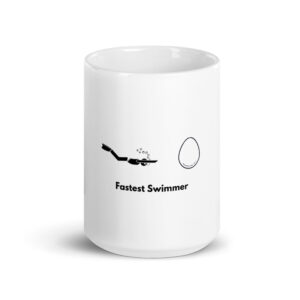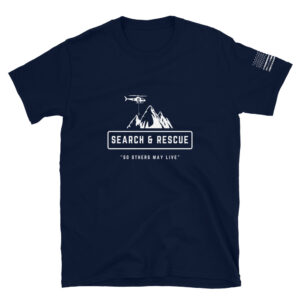Don't miss our flash to bang SALES!
Tuskegee Airman WWII
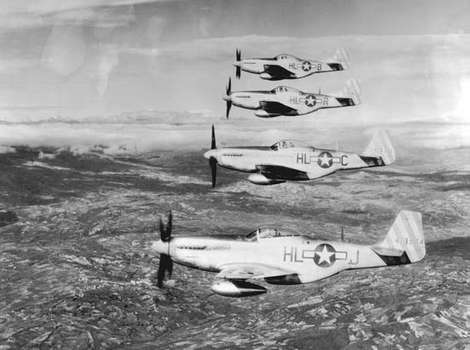 Tuskegee Airman Roberts Leroy WWII
Tuskegee Airman Roberts Leroy WWII
Question: The first thing I’ll start with is just to have you state your name, what military branch you were in and what your rank was.
Answer: Hm-hmm. Take off now?
Question: Yes, sir.
Answer: Okay, my name is Leroy Roberts, Jr. and I was in the United States Army Air Corps before it became the Army Air Force and the United States Air Force and I obtained the rank of lieutenant colonel during my tour of duty, years of service.
Question: How did you, or when did you enlist?
Answer: Let’s see. I was drafted, first of all, and was in the Army, first. I had my application in for cadet training but had not been accepted when the draft board reached over and collared me and I went into the Army. Wound up at Fort Benning, Georgia and then finally at Fort McClellan, Alabam
Answer: And while at Fort McClellan, Alabama, the Air Force accepted me for pilot training. And I went from Fort McClellan to Biloxi, Mississippi for basic training. And then from there to Tuskegee, Alabama for flight training.
Question: What were you doing when you got drafted?
Answer: Oh, I was working as a — I was a restaurant worker in Cleveland, Ohio. I had left my little hometown in Georgia and gone north to Cleveland and was in Cleveland, Ohio at the time I received a notice from my parents that the draft board was after my whereabouts. And I said I guess I better show up, so I did.
Question: Now had the war — already started at that time?
Answer: Yes, because I remember pretty much. Let’s see, the war’s — hm-hmm. I was trying to think. Let’s see, Pearl Harbor happened in 1941, December 7th of 1941. Yes, I was in Cleveland, Ohio at the time this occurred — this happened.
Question: So where did you do basic?
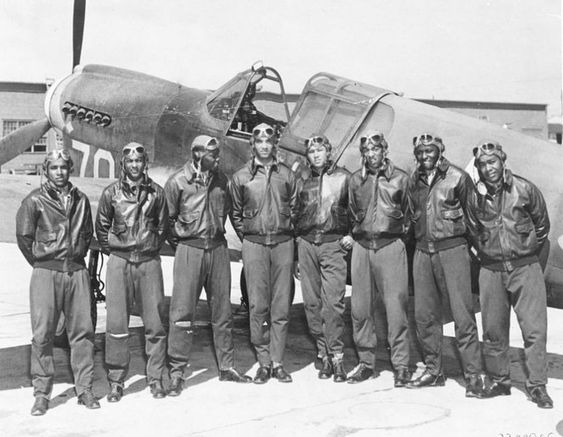 Answer: I did — well I went to the Army base at first because they had me at first, after the draft board insisted that I do a stint with them. And then I did my Air Force basic, if you want to call it that, at Biloxi, Mississippi. At Keesler — Keesler Field. And from there to Tuskegee, Alabama for pilot training.
Answer: I did — well I went to the Army base at first because they had me at first, after the draft board insisted that I do a stint with them. And then I did my Air Force basic, if you want to call it that, at Biloxi, Mississippi. At Keesler — Keesler Field. And from there to Tuskegee, Alabama for pilot training.
Question: Now you were — make sure I get the — Tuskegee?
Answer: Tuskegee.
Question: Tell me about that. Who, what, where?
Answer: Well, this is a long story. First of all, the Air Force didn’t want us — the Army Air Corps, the brass and what not. And we were not given the same opportunity as white cadets that were there for training. And it took a lot of help, lot of political pressure that was applied by certain people I will name like Senator Harry Truman and Eleanor Roosevelt and Judge William Hasty, Congressman Dawson of Illinois and Norris Cotton, Senator from New Hampshire, and Stiles Bridges from New Hampshire, and they kept pressing for us to be given the same opportunity as other Americans, you see. Cause there had been some stupid study earlier on in which said that we didn’t have what it took to be able to master the — the business of flying airplane. And we had a smaller brain, naturally a low brain capacity and what have you. And of course they did everything possible to keep us from going into this training. But with all the pressure, building as it did, they decided finally to build this Army airfield down there in Tuskegee, Alabama.
If you want to learn more about these heroes or support remembering these selflessness Airmen I also found this great shirt. The three book recommendations are incredible. My favorite is In Their Own Words: Tuskegee Airmen, couldn’t put it down. Their stories just hit you. Looking forward to my son also reading them one day.
Answer: And train us there. And we went on from there. The thought at that time was that we would not succeed. We were expected to fail. And of course we was determined that we would not fail, and consequently we — we succeeded in doing what we had to do and in good fashion.
Question: Let’s see what — what were you flying?
Answer: Initially? Well first of all you start out flying the various small planes, the J-3 Piper Cub; that was my first plane that I flew. And then the next one is primary training, which is a PT-17 which we flew. It’s a biplane, single engine of course, the PT-17. That’s what we took our primary training in; that’s why it’s called PT, primary trainer dash 17. And from there we went to basic training. That was a Vultee Vibrator — that was a nickname we gave it. And it was a little — it was all metal monoplane and it was a step up from the primary trainer, of course. And then the next training was the AT-6, advanced trainer, AT — advanced trainer dash 6. It was also called — built by North America and it was called a Texan. And it was quite a beautiful airplane. Then after we finished in advance training, if you were successful, then you go on to fighter transition. Get into fighter planes. Really getting into the big stuff then, the hot stuff. And my first fighter plane was a P-40 warhawk, which I really loved.
Question: Now that — the Tuskegee airmen — how many groups did they graduate from there? I mean, did they say, oh, this is a test thing and there’s this one group and they sent you out and you were one individual group?
Answer: No, they treated us pretty much as they did cadets — white cadets and what not. We’d — you’d graduate a class — usually a class per month. And you took 12 or 13 months to go through the full course. And the very first class of cadets, black cadets, was class 42C which consisted of five — five graduates. All right you — you — this is the way we named them. See, the year was ’42, so 42C. And we would — the alphabet was applied in this manner. A would be January, B would be February, C would be March. So they graduated in March of 1942. That was the first class of black pilots. Thirteen people started out in that class but only five graduated. And in that first class, of course, was Ben Davis, our leader, our fearless leader. 42C, very next class, 42D, there were only three people in that class. But as we continued training and more and more people were accepted — more and more pilots were accepted, and we started having bigger classes. Now my class was Class 44C, no 44E. That meant May of 1944. And in my class there was about 28 of us that graduated. Initially we started out all fighter pilots, all single engine, cause at that time the war needs were such that fighter pilots were in greater demand. And so all the pilots that graduated were single engine pilots. Later on they saw that we could really hack the program, they decided to give us multi-engine training, and we started training twin-engine pilots — multi-engine pilots.
Question: So when you got commissioned — or when you were sent off to active — to the war front, what were you flying?
Answer: Oh, after graduation?
Question: Hm-hmm.
Answer: After graduation we were flying, of course P-40 because we transitioned into that. And then later on the next airplane was the P-47. And we were taking, at that time, our overseas training. And then — things never worked out in a logical sequence. We took our overseas training — I did, in the P-47. When I got overseas to go in my group in Italy, we were flying P-51’s. So it wasn’t — the airplane I was most acquainted with — I was most familiar with another airplane altogether, which was all right with me because the P-51 was a very, very fine airplane.
Question: Now P-51 has a crew of —
Answer: That’s it, just one. That’s the beauty of being a fighter pilot — you have to do it all yourself. You — sole control. And as well, we thought we were so much better than all the other pilots — we do it all. You work the radio, you fire your guns, you fly your airplane, you do your own navigation, the whole bit. So that’s what makes a fighter pilot a — now, I know, people are going to criticize me about saying this — about saying we were a cut above the rest.
Question: So what was your task, then, when they sent you up in your plane, were you to escort other planes?
Answer: Well, if we get back to the war a bit, yes. We trained doing this, proud of going overseas. Flying in formation and flying along with other groups of airplanes, because primary missions, of course was to escort the heavy bombers. Heavy being things like B-24’s and B-17’s. You escort them into enemy territory, keep the fighters off of them and get them back home safely. Now we were criticized for a long time for not shooting down a whole heck of a lot of airplanes, but our primary mission was to stay with those bombers and protect those bombers because a lot of the other pilots were taking off and going after the German fighters just for the glories that they would get out of having shot down an airplane. We would have loved to have done that too, however our commander, General Davis, colonel at the time, had been asked by the commander of 15th Air Force and others for — to ask us to stay with our bombers because every time you lose a bomber you lose ten American boys. And we were asked to stay close by them and keep them safe. And we did that. Consequently we never lost a bomber — one of our bombers, to enemy fighters. I don’t think any other fighter group in the United States Air Force, Army Air Corps, Army Air Force, whatever you want to call it — can make that same statement. We never lost a bomber to enemy fighters.
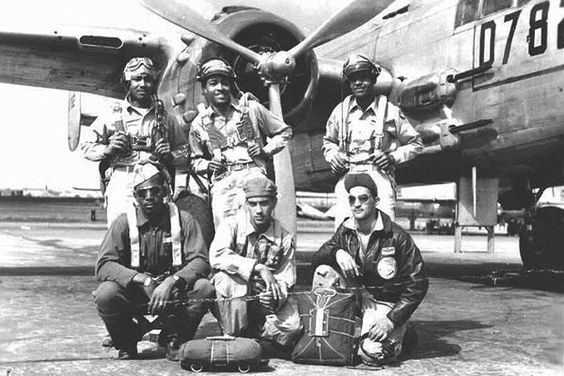
Answer: Gad, I don’t know. I’ll let you do the figuring on this one. I was born in 1921, I graduated in 1944 so that would make what, about 23?
Question: Twenty-three.
Answer: Okay, thanks for that.
Question: So you’re mid-20’s.
Answer: Mid-20’s, yeah.
Question: Okay. So you’re a young buck over there, solo fighter pilot out there, the stud in the airplane —
Answer: That’s right, yeah. A bloomin’ hero.
Question: So you — you go through all this training and you do all your dry runs and practice and all that and now you’re over in enemy territory and you have to fly your first mission. Do you remember it?
Answer: Hm-hmm. Yeah. I do remember it well. My first mission was flown on Christmas Day, 1944. And we was guarding — heavy bombers, of course, but I can’t remember the target, I’d have to go back to my Form 5 to see what our target was that day. But on Christmas Day, 1944 I flew my first combat mission.
Question: What was it like?
Answer: Oh, it was exciting, just being up there, in this sleek powerful fighter. High above enemy territory, deep in the enemy territory — expecting at almost any moment that the war would come crashing down on me if we were attacked or shot at with any heavy anti-aircraft fire or what have you. It just was exciting from the moment I took off till the moment we landed. You’re looking around, see what was going on to make sure that no enemy fighters were slipping in on us to shoot me down or shoot any of the bombers down, and we were busy. I was busy all the time, just with my thoughts about how important this mission was. How enemy, territory, my very first mission, in a big, big formation of airplanes, going out to strike the enemy.
Question: So they start coming at you. Did you — did you usually have air to air or did you have ground fire at you? What —
Answer: Well, we would always get ground fire — anti-aircraft fire which we call flak. They were forever shooting at us every time we came anywhere near a concentration of anti-aircraft guns, they fired. We always had to look out for that. And if you could see the puffs, they missed you. And so we would continue from that. But could always expect to be fired upon. And I was not attacked that many times from enemy aircraft. In the group — in the formations I was in, I was patting myself on the chest, I says nobody’s coming near us cause they know I’m here. But that’s typical fighter pilot attitude.
Question: Now that fighter pilots had a real different attitude than bombardier – bombers —
Answer: Bombers, right, completely different.
Question: You go a little faster than those big old —
Answer: They’re faster, you’re on your own, you got more things to do, and of course you’re not as responsible for as many people, of course, cause you had only yourself. But then an awful lot of details you darn well had better take care of if you want to continue breathing.
Question: Fear?
Answer: Fear?
Question: Yeah.
Answer: I don’t know. There was anxiety and excitement, but fear, I don’t think that fear, but I’ve had some real close moments because I flew two combat tours. I flew in World War II and I also flew in Kore
Answer: So, yeah, always some tense moments. Fear, I guess you could call it that but I wouldn’t describe it that way. I would just say anxious.
Question: When you were out there — okay, now you didn’t carry bombs, right? You had just —
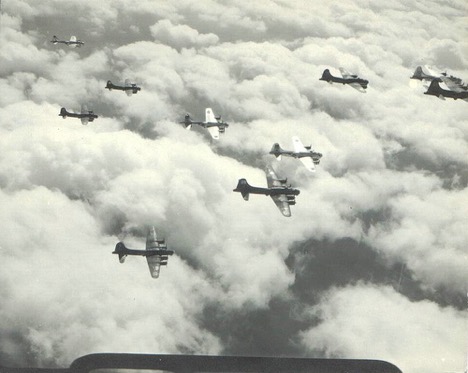
Question: Did you realize that the Tuskegee airmen were a part of history?
Answer: Was what?
Question: Was a part of history while it was happening?
Answer: I didn’t give it that much of a thought. I wish I had thought about it at the time; I’d kept better notes and probably written a book or two. But I was just there, a young American kid, doing his job, what I thought was expected of me, and I didn’t think in terms of being, the historical event that it turned out to be.
Question: Did you know that you were a test project? Did you know all of the stuff was going on that they wanted you not to —
Answer: I had no idea that all of it was this. I didn’t know until years later that we were considered an experiment — and an experiment that was expected to fail and all this sort of thing. I didn’t give it that much of a thought. I was so happy to have the opportunity to fly airplanes, which I wanted to do for such a long time and being a young black kid out of the state of Georgia where not very, not many good things were happening out in that neck of the woods, anyhow. But, yeah, I had this opportunity to fly some of America’s finest aircraft and I was just enjoying that portion of it.
Question: Would it have made any difference to you, do you think, if you had known?
Answer: I’m sure it would have made some difference. I — it would be difficult to suggest how much of a difference it would make, but it would have worked on my mind to have the idea that they were not sincere at the outset saying, this is an experiment and we don’t expect you to succeed — it would have had an effect on me. But I guess it’s better that I didn’t know.
Question: Were you accepted as an equal once you got down with your basic and you got put on the forefront, or was there still — those are the Tuskegee airmen and these are the other airmen?
Answer: Yeah, it — pretty much that way. There was still some degree of separation and umm, as far as that goes, a lot of it still exists today. But it still existed even though we were treated as officers and gentlemen, pilots, and that went along pretty well except occasionally we’d run into some bad apples here and there.
Question: What about when the war was over?
Answer: We had the hope that — after we had accomplished what we did — that we’d be accepted in better fashion than we had been prior, but things were essentially the same; they had not changed that much. We were hopeful that they would — and people would have paid more attention to what we did, what we accomplished, what we sacrificed, if you want to call it that. But didn’t make that much of a difference. It makes — it appears to me it makes more of a difference now — people are paying more attention to what we did, what we accomplished then back then, when I think it should have counted most. Because there are an awful lot of guys that are no longer with us today that have not had the enjoyment of this sort of appreciation.
Question: So you were stationed where?
Answer: At what point in time are you thinking now?
Question: When you first went over there to active battle.
Answer: Well, we landed in north Africa and we went by ship up to north Italy and my first base in Italy was Ramaceli, which is on the east coast of Italy, on the Adriatic Se
Answer: And I flew most of our missions from Ramaceli. And later on we flew some missions from the northern part of Italy in a place called Catalec
Answer: And during World War II most of my missions were flown from Ramaceli or Catalec
Answer:
Question: What was an average day like when you’re not doing a mission?
Answer: Average day, well, if there was a mission involved they would wake us up about 4:30, 5:00 in the morning and up and shower, shave, get dressed, down to the mess hall for breakfast, and then to the briefing room to be told about the mission of the day, where we were going, what the target was, what group we’d be escorting, and headed toward the target, headed out. They’d tell us about the number of anti-aircraft guns to expect, some of them. And usually an average mission would last anywhere from 4-1/2 to 5 hours, generally. And back to base and after the mission and debrief with intelligence people, tell them what we saw, what we did, how many enemy airplanes and all that sort of thing. Anything that would help from an intelligence standpoint. So you can keep a pretty good idea of what the enemy was doing and what he was capable of doing. And after that I guess we head for the bar. That was usually a typical day. In the evening, of course, there was always a movie as a rule. Our movie was shown in the same place that we had the briefing early in the morning. It was also where we had our big chapel, too, so what the fellow would do – on Sunday they’d go to — to their religious meeting in order to have a good seat at movie time. (laughs)
Question: The chaplain probably set it up that way.
Answer: Yeah, probably did. I wouldn’t doubt it. Yeah, chaplain probably had a lot to do with the way it was scheduled.
Question: Were you on base most of the time or did you have leave from base or —
Answer: Well, there wasn’t that much leave to be had, because you know, war torn Italy at that time was just that. Well, there were ships we would take sight-seeing once in awhile, but we were on base most of the time. We’d get a jeep or a truck sometimes and go throughout the countryside. But most — I didn’t, most of my stay was on base.
Question: So was it — in your mind while you were there, was it 24 hours a day, seven day a week war while you’re very aware of war going on or do you —
Answer: Oh, yeah, we were, we were aware, and we knew the requirements, the need for us and the need for us to be available and ready. So it — 24 hour a day thing in our minds.
Question: The question I’ve asked everybody today — when the war ended — well, first of all, let me ask, where were you when the war ended?
Answer: I was in Italy at Cataleca, I believe, northern Italy.
Question: And how did you find out? What was that like?
Answer: Oh, we had good radio coverage, everything, Stars and Stripes paper, the radio and good communications, so there was no problem about finding out that the war had ended.
Question: Did you party or was it just another day or —
Answer: Oh, yeah, there was a party – there was partying going on. Firing flares and all that sort of thing; it was a good celebration at the end.
Question: So one day the war’s there, the next day the war’s not there. Does it just stop in your mind?
Answer: No, there — there are things that continue anyway, you know. There’s flying to be done, you’ve got to keep your proficiency and there are airplanes that need to be flown — test flown and things like that. So activity continued almost as if the war was still — still on. Because with the engineering people and maintenance people, the maintenance has to go on cause airplanes are funny and sort of an animal — you’ve got to keep those things — keep your eye on those things.
Question: So I just had this thought in my mind — I would think that a lot of people, probably my generation and all that, because of the news reel footage that we see and all that, think that there were these parties that went on for months.
Answer: No. It wasn’t quite like that. What people started to think about was making preparations to go home. War was over, when do I get out of here, you know?
Question: What — what do you think that would be a — what do you think the message would be for generations to come that you would want to leave with them about either World War II, war in general?
Answer: Well, the message generally that I would have for people coming along now is to have — to somehow have a love of God, a love of country, and that is important, because in any way, you do make some special sacrifices that an individual doesn’t realize as a rule until you’re in it and out of it. So as long as you’ve got the belief that your country is doing what it should, or making an attempt to do what it should, you should be ready to defend it. And if your country is right, then you should not have any problem dealing with that. And of course keeping your faith in God. I consider myself to be a Christian man and I can say you’ve got to have faith in God and you’ve got to have faith in yourself. You’ve got to do believe you can do what it is you’re called on to do.
Question: Sounds like you had no question about that when you were —
Answer: That’s right.
Question: Called and saw that airplane and —
Answer: That’s right, no question at all. I knew what I was out to do and who — how desperate times were and realized of course that the intent of the enemy and part of my job that was to keep his dreams from coming true.
Question: Did you kind of disassociate — I mean did — and I don’t want to get off on the issue of did you kill anybody or anything like that, what I’m asking is this. You went out in that plane, there were other planes coming at you, you’re defending — in your mind did you say that’s an enemy and just leave it at that and that’s how you deal with that — survival?
Answer: I considered the enemy as a very special sort of person because when I — when I looked, and being a minority naturally I would think this way, that I know how badly they treated so many people during the course of the war, and I had some strong feelings about our enemy, no matter who we were fighting at the time that I was in a battle of some sort because they were people who treated in horrible ways, just horrible fashion, that I had some strong feelings for a long time about the enemy and to me the enemy was the enemy. And I say he remained the enemy for a long time. I’ll have to be frank that way.
Question: When you say a long time, a long time after the war?
Answer: After the war.
Question: Oh, really.
Answer: Yes.
Question: But did you put — was that enemy a generic thing or — or did you have a specific?
Answer: I had no specific because I had no losses that I could attribute to — accidents I was talking about. The losses to other people — the treatment of the people that — the horrible manner in which they were treated and killed. That was it more than anything else.
Question: How do you think — this is probably a hard one because you don’t have anything to compare it with, but how do you think, having served and been a part of a war, two wars actually, changed our perspective of life?
Answer: Oh, I don’t know whether so much a change as just a recognition of — take things as they come and do it one day at a time because there’s so many things that I have striven for and that our race has strived to have happen. Even though you — you’re hopeful, feel that it should be now, hasn’t always been now. You have to keep working for it and toward it. And one of the things I guess I’ve learned is just keep hacking at it till you get it down — until you get it accomplished.
Question: Did you ever fear death while you were over there? Because it sounds like you were pretty confident. You got in that plane and boy, you were up there — did you just — never thought it was going to happen to you or —
Answer: That’s right. Maybe to somebody else but not to me. I never thought that — I never — I guess I never really thought about death — there was a possibility that it could happen to me. You know, I’m going to do it and I’m going to survive it. But I’ve been through some horrific missions in which to survive was not expected. You know, flying against the enemy and flying in the sort of weather that we flew in, and at the time we had no real good recovery equipment, but I made it anyway. That comes from that very strong determination to get it done, do it, and — so, it’s that confidence you have in yourself and your equipment.
Question: Did you bring that with you or did you learn that through your training?
Answer: Well, having the sort of upbringing that I did, I had some of that with me, but I learned that — (See next interview with Mr. Leroy for the rest of his war stories)
(Courtesy of WWII Voices in the Classroom, www.WWIIhistoryclass.com)
Popular Products
-
Fastest Swimmer
$12.00 – $16.50Select options This product has multiple variants. The options may be chosen on the product page -
Rotorhead
$19.50 – $28.00Select options This product has multiple variants. The options may be chosen on the product page -
Search & Rescue
$25.00 – $33.50Select options This product has multiple variants. The options may be chosen on the product page -
SAR Stache
$32.00 – $40.50Select options This product has multiple variants. The options may be chosen on the product page

